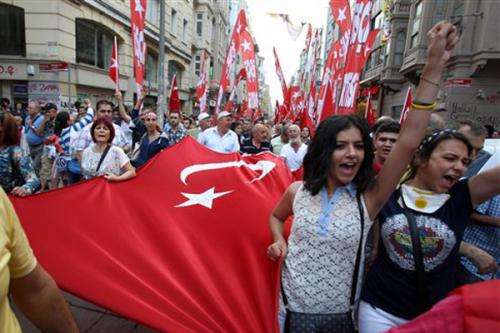Protests have changed Turkey, says expert

Ayça Alemdaroglu, a lecturer at Stanford, explains how demonstrations over plans to bulldoze an Istanbul park turned into a broader indictment of the government's ruling party.
The upheaval in Turkey started nearly two weeks ago with peaceful demonstrations over the planned removal of Gezi Park, one of the last green spaces in Istanbul, to make way for a shopping mall.
A police crackdown on those demonstrations sparked a broader uprising against the government and its leader, Prime Minister Recep Tayyip Erdogan, who many believe has become increasingly authoritarian.
Erdogan, who was democratically elected and has been in power for a decade, has been defiant. Violence has injured thousands and led to at least three deaths, including of a police officer.
Ayça Alemdaroglu, a Stanford lecturer in the Thinking Matters Program, is currently in Turkey witnessing the clashes. Alemdaroglu is slated to teach a course in the Urban Studies Program next year that will take a comparative look at the cities and citizens of the Middle East, focusing on Cairo and Istanbul, and including popular protest in these cities.
In email correspondence, she responds to questions about the situation, specifically looking at the role the youth are playing.
Can we draw comparisons between the protests in Turkey to antigovernment demonstrations and citizens' uprisings elsewhere?
The Gezi Movement's main difference, at least when it began, was that it was very much "a right to the city" type of a movement. Protesters are concerned for trees, parks and public spaces and have reacted to the profit motive and neoliberal policies that inform the ruling party's urban planning and reconstruction. They want their right to participate in the planning of their city.
But similar to Tahrir Square in Egypt, the Occupy movement in the U.S. and the Indignados in Spain is that the Turkish uprising has no leader. It brings together people from all walks of life, with different political affiliations and agendas, people of different ethnic and religious backgrounds.
Protesters include students, professional associations, labor unions, small left-wing parties, anti-capitalist Islamists, Kurdish politicians, LGBT groups, the main opposition party, soccer fan groups and environmentalists, for example.
And, like Tahrir, the Occupy movement and the Indignados, Turkey's uprising is also youth driven. The large majority of people on the streets are young adults and students. Most of them do not have any history of political activism. The power of this movement, I believe, is its success in mobilizing tens of thousands of apolitical or cynical young people.
Is social media, then, also having a similar impact?
Yes. Similar to the Arab Spring, the role of social media is undeniable in the uprising in Turkey. I would not go as far as to say this is a social media revolution, as some have redundantly argued about Tahrir. But clearly, protestors in Turkey would not have been able to organize and make themselves heard this well and be able to undo the silence of Turkish media channels and their pro-government broadcasting, if they did not have access to social media.
The pictures from Taksim Square, where many of the clashes have occurred in Istanbul, are also causing people to compare this to the Arab Spring, with the big caveat that this government was democratically elected. What are you hearing and seeing there?
Similar to the Arab Spring, we see an excessive use of force by the police against protestors, which ironically has contributed to the growth of the movement and expanded the protest from about trees to rights and people.
Therefore, finally, similar to Tahrir, in the midst of police force and the uncompromising attitude of Erdogan, protestors in Turkey are sounding like they want to put an end to the current government.
What are the risks to Erdogan?
It doesn't look like people will drop their demands anytime soon. The government may drive people out of Gezi Park by force and repress protests in major cities. Protests are taking place also in Ankara, Turkey's capital, and other cities. Having seen their power, numbers and solidarity, protesters, I believe, will come back in one way or another.
Erdogan's global image as a democratically elected popular leader of a Muslim majority country, an image very much embraced and promoted by the U.S., is also at risk. Eventually, this is going to undermine his credibility both within his party and outside.
What is it like on the ground now?
I am worried about relentless police aggression and more people getting injured. I am also worried and outraged about Erdogan's apparent lack of understanding of the protesters – who they are and their demands – and his effort to portray the protesters as marginal groups playing their part in a plot against his government.
But I am hopeful that people are making their voices heard about their dissatisfaction with the government's increasing violation of basic rights and autocratic rule. Pundits who follow the uprising in Turkey constantly ask if this will lead to a major change in the country. My response is that it already did.
Provided by Stanford University



















